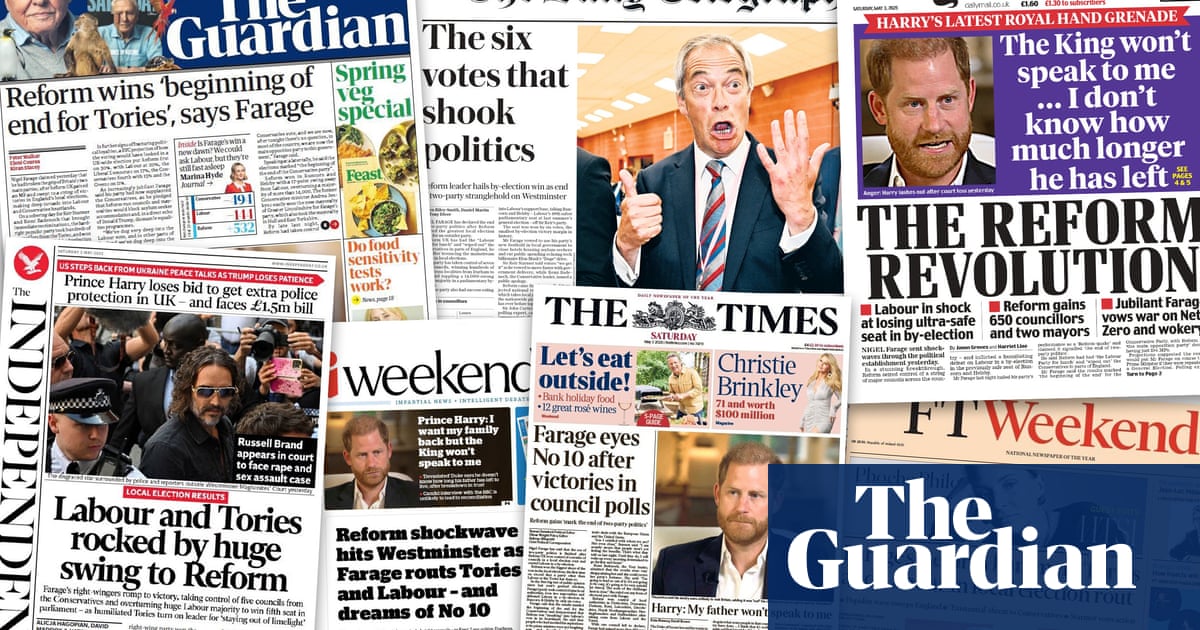The article presents a significant political event in the UK, focusing on the Reform party's recent successes in local elections. The narrative emphasizes the implications of these results for both the Conservative and Labour parties, while highlighting the emergence of Reform as a formidable player in British politics.
Political Landscape Shift
The article indicates a potential shift in the political landscape, characterized by Nigel Farage's assertion that the Reform party could signal the end of traditional two-party dominance in the UK. The language used in the articles suggests a sense of urgency and alarm among established parties, particularly with phrases like "humiliated Tories" and "angry Labour." This choice of words aims to create an impression of instability and a looming crisis within these traditional political structures.
Public Sentiment and Perception
The coverage across various newspapers seems to reflect a growing discontent among voters with the mainstream parties. By focusing on Reform's ability to win a traditionally safe Labour seat, the articles highlight a disconnect between the parties and their constituents. This may foster a perception that voters are increasingly seeking alternatives, which could lead to greater support for populist movements.
Information Manipulation and Hidden Agendas
While the article captures the essence of the electoral results, it may also obscure broader issues facing the electorate. For instance, the emphasis on party failures and the sensational framing of Reform's victory could divert attention from other pressing concerns, such as economic policies or social welfare programs. This selective focus raises questions about the intent behind the reporting, suggesting a potential agenda to promote a particular narrative.
Comparative Analysis
When compared to other political analyses, this article's framing aligns with a trend of sensationalism in media reporting on populist movements. The emphasis on conflict and dramatic shifts may resonate with audiences seeking straightforward narratives but could also contribute to polarization within the electorate. The portrayal of Reform's rise as a "shockwave" suggests a desire to provoke a strong reaction from readers, thereby reinforcing existing divides.
Implications for Society and Economy
The potential consequences of this political shift are substantial. The emergence of a strong Reform party could lead to significant changes in policy, particularly in areas like immigration and environmental regulation, as indicated by Farage's comments on asylum seekers and Net Zero initiatives. Such changes could have wide-ranging implications for social cohesion and economic stability, particularly if they resonate with disaffected voters.
Target Audience
The articles seem to target individuals who are disillusioned with the current political establishment. This includes those from working-class backgrounds who may feel neglected by mainstream parties. By focusing on populist rhetoric, the Reform party aims to capture the support of these demographics, positioning itself as an alternative to the status quo.
Market Impact
While the immediate impact on financial markets may not be evident, the political instability suggested by these election results could lead to uncertainties in investment, particularly in sectors sensitive to government policy changes. Companies in industries such as renewable energy and social services might be particularly affected by a shift towards more hardline policies advocated by Reform.
Geopolitical Considerations
On a broader scale, the rise of populist parties like Reform has implications for the UK's standing in global politics, particularly regarding issues of immigration and climate change. The article's focus on these themes ties into current global discussions about governance and populism, highlighting the interconnectedness of local electoral outcomes with international trends.
Artificial Intelligence Influence
It's possible that AI tools were employed in crafting the article, particularly in analyzing and summarizing the election results and public sentiment. The structured presentation and emphasis on key phrases suggest a methodical approach, potentially influenced by AI models designed to prioritize impactful news elements.
The article's tone and language choices indicate a clear intent to draw attention to the Reform party's rise while simultaneously portraying established parties in a negative light. This could be seen as a form of manipulation, as it uses emotive language to provoke a reaction from readers and to shape public discourse around the election results.
In conclusion, while the article discusses genuine electoral developments, its framing and language may contribute to a narrative that serves specific political agendas rather than providing a balanced overview of the situation.
